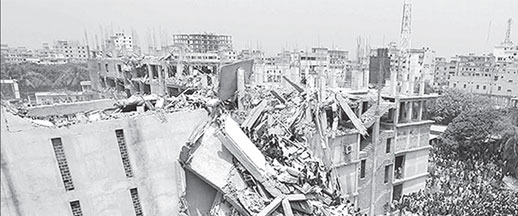Tomb of indifference to worker's life
The tragic case of the
collapsed building in Bangladesh which resulted in hundreds of deaths is
yet another example of how workers' safety is undermined by the pursuit
of profits.
by Farooque Chowdhury
It's death, death only. It's death of about 200 garments workers and
others as a building collapsed in Savar, a Dhaka suburb. It's exposure
of nourishing indifference to life; it's revelation of nurturing greed
at the cost of life. So death dominates the Bangladesh April-days of
2013.
Media report: Workers were compelled to enter the building to resume
production in the 4-5 garments factories that the multi-storied building
housed although the building was identified unsafe and risky a day ago.
The unfortunate workers were unwilling to enter the building. But
supervisors forced them with sticks. The building's upward raising was
unauthorized. Now, it's "difficult" to find the party responsible for
the incident.
 |
|
The collapsed building
in Bangladesh |
After going through media reports one can't escape the feeling of
witnessing hapless animals being pushed to a slaughter house, a feeling
of being controlled simply for profit. And, one can't escape an image of
a cruel, corrupt system.
Media reports unveil a lot: reluctance to consider human life, zeal
for uninterrupted production, patronisation of a system moulded for
profit, flaunt power that tramples law, corrupt connection that
disregards human life. And, the scene says a reality of greed driven
dominance. And, the scene says helplessness of a broader society in
front of a juggernaut.
Following the incident, common people, the silent majority shall
mourn; the dead unfortunates' relatives shall weep silently; sane souls
shall search psychology of property owning classes.
Then, a silence shall shroud sad memories. And, moments shall
continue ticking until another similar incident resurrects publicly.
This is the prevailing pattern. It's a pattern of unnatural death of the
weak, of the workers.
History
One can look at history as one move from these issues. Pertinently
one can search the number of collapse of buildings constructed by the
British raj and the Mughals. One can compare technology and technical
knowledge between the three: the Mughals, the colonialists, the Savar
and similar cases. Even, one can compare the enforcement of relevant
law, styles and levels of monitoring/supervision of these three.
One can ask: Were they, the colonial masters and the Mughal emperors,
less greedy than today's masters of capital? Were they more efficient in
areas of construction, supervision, enforcement and governance than the
propertied classes of today? What's and where does lie the root of
better construction, supervision, enforcement of law? Is it simply
reluctance, indifference, inefficiency and corruption that played role
in the collapse of the building? Even, are not there roots of
indifference, inefficiency and corruption if these are the causes behind
the collapse incident? Do these show a segment's "mental" capability or
incapability?
Answers to these questions will help identify the problem and rectify
measures being followed. Even connections and actors can be identified.
A graver picture can emerge.
A sociologist or a political scientist shall put a number of
questions, and, those are related to people: How long shall the
commoners silently tolerate these collapses and deaths? Is there no
limit to tolerance? What waits if mass tolerance is not unlimited? Is
there any possibility of political expression if the limit of tolerance
is crossed?
Working hands and brains that produce for owners of capital shall not
remain inactive and silent forever. Not only political and economic
misdoings, deaths can also devour a system's acceptability. It does not
happen instantly. It happens slowly and silently. But it happens.
This pushes mature systems to practice rules of necessary measures:
accountability, enforcement of pronounced measures. This pushes mature
systems even to impose fine on a head constable or on a member of a
royal family for violation of traffic rule. Only immature systems dream
of hiding skeletons in cupboards.
Value
The commoners shall question: Is this the way of payment for
producing surplus value? Have deaths of workers turned the norm? And,
the commoners shall not accept the payment, shall not accept the norm.
The commoners shall compare the number of unnatural deaths of commoners
and capital owners over the years and shall try to find out the causes
active with the incidents as in their humble life they also yearn for
natural death.
Propaganda tries to manipulate peoples' mind. But ultimately it's
reality that teaches, that helps summarise experiences gathered over a
long period. This makes propagandists ultimately fail. Even charity
ultimately does not work. It slows down expression of discontent for a
temporary period. But it has limit. Otherwise emperors could have
escaped rebellions by resorting to charities. And, death is more
powerful than charity.
The working class, no matter how much wretched they may be, don't
long for unnatural death. Don't they deserve a natural death? This
question shall haunt all workers as they experience repeated unnatural
deaths of their class members. They shall question the amount of profit
capital requires to survive? And, they shall search answers to the
questions as they find their deaths are repeatedly neither natural nor
dignified.
It's difficult to ignore the working class. It's so difficult that
anti-worker forces are compelled to propagate pro-worker claims. The
Savar worker-deaths shall live as capital's tomb of indifference to
worker-life and shall remind workers of all generations the cruel
character of capital. It shall remind workers the state of workers' life
in a society. It's not a happy situation for capital as capital can't
escape wrath of labour.
- Third World Network Features.
|


